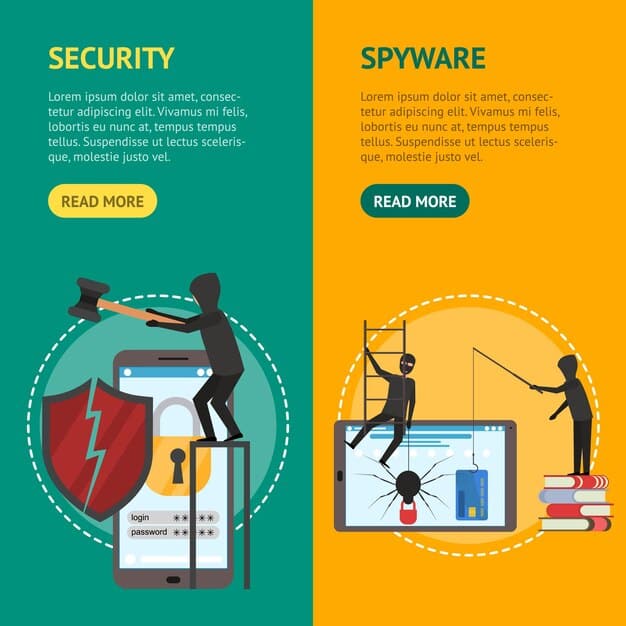Cybersecurity Bill: How It Impacts Your Online Privacy

How the New Cybersecurity Bill Could Affect Your Online Privacy: A Detailed Analysis explores the potential impacts of new cybersecurity legislation on personal data protection and online freedoms in the US.
The digital landscape is constantly evolving, and with it, the laws and regulations governing our online activities. A new cybersecurity bill is on the horizon, and understanding how the new cybersecurity bill could affect your online privacy: a detailed analysis is crucial for every internet user. This article delves into the specifics of this bill, its potential implications, and what you need to know to protect your digital footprint.
Understanding the Cybersecurity Bill: An Overview
Cybersecurity is a growing concern, and governments are constantly seeking ways to enhance protection against cyber threats. The introduction of a new cybersecurity bill aims to address these concerns, but it also raises questions about its impact on individual privacy. Understanding the core components of this bill is essential to grasp its potential consequences.
Key Provisions of the Bill
The proposed legislation includes several key provisions designed to bolster cybersecurity defenses and response capabilities. These measures, while intended to improve overall security, could significantly impact how personal user data is handled and monitored.
- Data Collection and Retention: The bill may expand the types of data that can be collected and retained by government agencies.
- Information Sharing: It could facilitate greater information sharing between government and private sector entities.
- Surveillance Powers: Expanded surveillance powers could allow for increased monitoring of online activities.
These provisions have sparked debate over the balance between national security and individual liberties. The implications of these measures are far-reaching, affecting everyone from ordinary citizens to businesses and organizations operating online.

The bill seeks to establish a framework for identifying, assessing, and responding to cybersecurity risks. This includes mandates for federal agencies to implement specific security protocols and conduct regular risk assessments. However, this also opens avenues for potential overreach and abuse of power, particularly concerning privacy rights.
In conclusion, understanding the cybersecurity bill requires a detailed look at its provisions and their potential impact on data collection, information sharing, and surveillance powers. These provisions could reshape the digital landscape and affect individual online privacy significantly.
How the Bill Could Impact Your Online Privacy
The primary concern surrounding the cybersecurity bill is its potential impact on online privacy. The enhanced powers granted to government and private entities could lead to increased surveillance and data collection, raising significant privacy issues. It’s crucial to examine specific ways in which personal data could be affected.
Potential Privacy Violations
The bill’s provisions could create opportunities for privacy violations, including unauthorized access to personal data and misuse of collected information. Understanding these risks is essential to protect personal privacy.
- Increased Surveillance: Expanded surveillance powers could lead to indiscriminate monitoring of online activities.
- Data Breaches: Greater data collection increases the risk of data breaches and exposure of sensitive information.
- Lack of Transparency: Limited transparency regarding data handling practices could make it difficult for individuals to understand and control their data.
These risks are not merely theoretical; they represent potential real-world consequences. The erosion of online privacy can have a chilling effect on free speech and democratic participation, as individuals may become hesitant to express their views or engage in certain online activities.
The bill may grant authorities the power to compel internet service providers (ISPs) and other tech companies to share user data without a warrant, raising serious constitutional concerns. This could lead to a situation where individuals are treated as suspects based on their online behavior, rather than being presumed innocent until proven guilty.

Furthermore, the bill’s broad language could be interpreted in ways that allow for the collection of metadata, such as browsing history and location data, without adequate oversight. While metadata may seem innocuous, it can be used to create detailed profiles of individuals and their habits.
In conclusion, the cybersecurity measures are essential to protect online privacy, but the bill should be drafted and implemented carefully to avoid unintended consequences that undermine individual rights and freedoms. By addressing the potential privacy violations and ensuring adequate oversight and transparency, the bill can strike a better balance between security and privacy.
Balancing Security and Privacy: Finding the Right Approach
One needs to remember the ongoing debate surrounding cybersecurity legislation focuses on balancing security needs with individual privacy rights. Finding the right approach involves implementing measures that enhance security without unduly compromising privacy. The key lies in creating a legal framework that respects constitutional principles and human rights.
Safeguarding Privacy in Cybersecurity Measures
To protect individual privacy while enhancing cybersecurity, the bill should incorporate several crucial safeguards. These safeguards can help prevent abuse of power and ensure that privacy rights are respected in the digital age.
- Warrant Requirement: Require a warrant based on probable cause for accessing private communications and data.
- Transparency and Oversight: Establish independent oversight bodies with the power to review and audit data handling practices.
- Data Minimization: Limit data collection to what is strictly necessary for legitimate security purposes.
These safeguards are essential to maintain the checks and balances necessary to prevent government overreach. The historical context of surveillance abuses underscores the importance of these protections. Without them, there is a risk that the bill could be used to target political dissent or discriminate against specific groups.
Furthermore, the bill should include provisions for redress, allowing individuals to seek legal recourse if their privacy rights are violated. This would serve as a deterrent against abuse and provide a mechanism for accountability. Additionally, strong encryption standards should be promoted to protect data in transit and at rest.
Finding the right approach also requires ongoing dialogue between policymakers, technology experts, and civil society organizations. This collaborative process can ensure that the bill reflects a broad range of perspectives and addresses potential unintended consequences.
Therefore, by incorporating privacy safeguards, promoting transparency, and fostering collaboration, the cybersecurity bill can strike a better balance between security and privacy, ensuring that individual rights are respected in the digital age.
The Role of Technology Companies in Protecting Privacy
Technology companies play a critical role in protecting online privacy. Their ability to design and implement privacy-enhancing technologies can significantly impact how personal data is collected, stored, and used. These companies must take proactive measures to safeguard user privacy.
Privacy-Enhancing Technologies
One effective way for tech companies to protect user privacy is to adopt privacy-enhancing technologies such as:
- End-to-End Encryption: Ensures only the sender and recipient can read the content of messages.
- Anonymization Techniques: De-identify data to prevent it from being linked back to individuals.
- Differential Privacy: Add noise to datasets to protect individual privacy while allowing for statistical analysis.
These technologies can significantly reduce the risk of data breaches and unauthorized access to personal information.
In addition to implementing these technologies, tech companies should also adopt privacy-by-design principles, which involve integrating privacy considerations into the design and development of new products and services. This approach emphasizes minimizing data collection, providing users with control over their data, and being transparent about data handling practices.
Transparency is also essential. Tech companies should clearly and accessibly communicate their privacy policies to users, explaining what data they collect, how it is used, and with whom it is shared. They should also provide users with the tools to access, correct, and delete their data.
Ultimately, tech companies have a moral and ethical obligation to protect the privacy of their users. By adopting privacy-enhancing technologies, implementing privacy-by-design principles, and being transparent about data handling practices, they can help create a digital ecosystem that respects individual rights and freedoms.
In conclusion, the role of technology companies in safeguarding user privacy is indispensable. With the right technologies and principles, they can help construct a safer and more private digital environment for everyone.
International Perspectives on Cybersecurity and Privacy
Cybersecurity and privacy are global issues, and various countries have adopted different approaches to address these challenges. Examining international perspectives can provide valuable insights into potential solutions and pitfalls. It is crucial to understand the different legal frameworks and cultural norms that shape these approaches.
Comparing Cybersecurity Laws Worldwide
Different countries have enacted various cybersecurity laws, each with its own strengths and weaknesses.
- European Union: GDPR sets a high standard for data protection and privacy rights.
- China: Implements strict cybersecurity laws that prioritize state control.
- United States: Focuses on sectoral approaches, with different laws for healthcare, finance, and other industries.
A comparative analysis reveals significant differences in how these countries approach cybersecurity and privacy. GDPR, for example, grants individuals extensive rights over their data, including the right to access, correct, and delete their information. In contrast, China’s cybersecurity laws prioritize state control and allow for extensive surveillance of online activities.
The United States takes a more decentralized approach, with different laws governing different sectors of the economy. This approach allows for flexibility but can also result in inconsistencies and gaps in protection.
These international perspectives highlight the importance of balancing security needs with individual rights and freedoms. They also underscore the need for international cooperation to address cross-border cyber threats and protect online privacy.
Learning from each other’s experiences and adopting best practices can help countries develop effective cybersecurity laws that respect human rights and promote a safer and more secure digital world. The challenge lies in finding a way to balance competing interests and ensure that cybersecurity measures do not unduly infringe on individual liberties.
In conclusion, international perspectives provide valuable insights into the complexities of cybersecurity and privacy. By comparing different approaches, countries can learn from each other and develop laws that balance security needs with individual rights and freedoms.
Steps You Can Take to Protect Your Online Privacy
Even with new cybersecurity legislation, individuals can take proactive steps to protect their online privacy by adopting simple habits. Emphasizing the importance of protecting your data from hackers, malware, and misuse by third parties, we can all adopt simple habits.
Practical Tips for Enhancing Online Privacy
In order to further protect your data, one can implement these steps:
- Use Strong Passwords: Employ long, unique passwords and a password manager.
- Enable Two-Factor Authentication: Add an extra layer of security to your accounts.
- Review Privacy Settings: Adjust privacy settings on social media and other online platforms.
Using strong passwords and enabling two-factor authentication are essential steps to protect your accounts from unauthorized access. A password manager can help you generate and store complex passwords, making it easier to follow this advice. Additionally, reviewing and adjusting your privacy settings on social media and other online platforms can limit the amount of personal information you share with the world.
Furthermore, be cautious of phishing scams and other attempts to trick you into revealing personal information. Never click on suspicious links or open attachments from unknown senders. Keep your software up-to-date to patch security vulnerabilities, and use a reputable antivirus program and a VPN to protect your data.
Finally, be aware of the information you share online and consider the potential consequences. Think before you post, and remember that anything you publish online can be seen by others. Regularly review your online presence and remove any outdated or unwanted content.
To summarize, by taking these practical steps, individuals can significantly enhance their online privacy and protect themselves from cyber threats. It is essential to be proactive and take responsibility for safeguarding your personal information in the digital world.
| Key Point | Brief Description |
|---|---|
| 🛡️ Bill Overview | Understanding the main provisions and aims of the cybersecurity bill. |
| 🔑 Privacy Impact | How the bill could affect your online privacy and data security. |
| ⚖️ Balancing Act | Finding the balance between security and individual rights. |
| 💡 Proactive Steps | Actions individuals can take to protect their online privacy. |
Frequently Asked Questions
The main goal is to enhance the nation’s cybersecurity defenses against evolving cyber threats and protect critical infrastructure.
The bill may expand the types of data that can be collected and retained by government agencies for security purposes.
Expanded surveillance powers and increased data collection could lead to privacy violations and erosion of individual liberties.
Use strong passwords, enable two-factor authentication, and review privacy settings on online platforms to minimize personal data exposure.
Technology companies can implement privacy-enhancing technologies, adopt privacy-by-design principles, and be transparent about data handling practices.
Conclusion
In conclusion, how the new cybersecurity bill could affect your online privacy: a detailed analysis reveals a complex balancing act between national security and individual liberties. While the bill seeks to bolster cybersecurity defenses, it also raises legitimate concerns about the potential erosion of privacy rights. A comprehensive understanding of the bill’s provisions, coupled with proactive measures to protect individual online privacy, is essential to navigate this evolving digital landscape.





